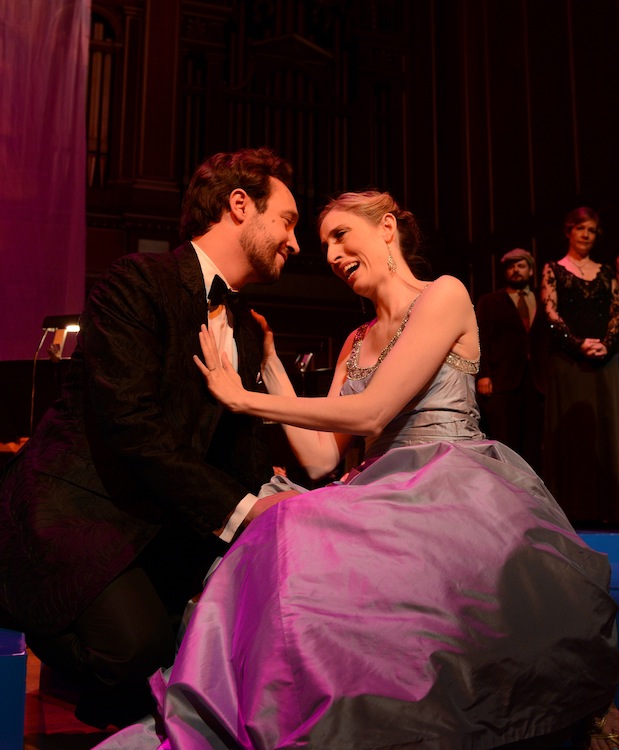Boston Baroque wraps season with dazzling Monteverdi

Fernando Guimarães and Jennifer Rivera in Boston Baroque’s production of Monteverdi’s “Il ritorno d’Ulisse in patria” Friday night at Jordan Hall. Photo: Clive Grainger
Boston Baroque delivered a dazzling performance of Claudio Monteverdi’s Il ritorno d’Ulisse in patria Friday night at Jordan Hall of the New England Conservatory. Cast and staging came together for a moving show, in which the opera did not show its three hundred and fifty years.
The opera is based on Homer’s Odyssey, after a libretto in Italian by Giacomo Badoaro. The story focuses on the last segment of Ulysses’s journey–his homecoming–and on his wife, Penelope, who has been waiting twenty years for his return from the Trojan War. In Ulysses’s absence, Penelope has been courted by increasingly bold suitors. Meanwhile, Ulysses has been washed ashore after years of travel. With Minerva’s aid, Ulysses disguises himself as an old man, enters the palace, and kills the insolent suitors. However, Penelope is not convinced that this stranger is her husband; only when he accurately describes the linen of their bedsheet, information only he would know, is she satisfied.
Monteverdi’s opera has an interesting mix of Renaissance imagination and Shakespearean elements. The opera opens with an allegorical scene depicting human fragility being buffeted by Time, Fortune, and Love. It’s a scene that clearly stems from the Rota Fortunae, or Wheel of Fortune, so ubiquitous in ancient and medieval philosophy. The opera also displays its debt to the Shakespearean—rather than the Homeric—by featuring a broad, comic supporting cast in the form of Penelope’s suitors. There is even a clown character, Iro, the suitors’ sidekick, who delights in gluttony and is so heartbroken when the suitors are slain that he commits suicide.
But the heart of the opera is Penelope’s constancy and Ulysses’s rightful recovery of his kingdom and his wife. Portuguese tenor Fernando Guimarães is here making his U.S. debut as Ulysses, and gave a smoldering and passionate interpretation of a fairly uninspiring role. None of the cleverness, hubris, or fatigue of Homer’s original is manifest in Monteverdi’s version, but Guimarães–aided by an expressive tenor capable of both ringing declamation and tender wisps of sound–was nonetheless magnetic.
But the show really belongs–and rightfully so–to Penelope. Whereas Homer’s Penelope is two-dimensional and enigmatic, Monteverdi and his librettist were clearly inspired by the possibilities of her character. This is a woman frozen in time by grief, thawed only reluctantly by Ulysses’s return.
Jennifer Rivera provided a stunning performance. Especially notable were her pleas for Ulysses to return in her opening scene (“Di misera regina…”), delivered with touching simplicity and a contralto’s strength. She proved equally at home in the florid music, as in Penelope’s joyful aria after fully accepting her husband’s return.
The rest of the cast was impeccable, with standouts including Leah Wool’s imperious Minerva and Marc Molomot’s loathsomely funny Iro. Owen McIntosh, as one of Penelope’s suitors, was a particularly fine Pisandro, with a smooth, effortless tenor and a cocky gait.
Because no autograph version exists and no instruments are specified, each performance of Il ritorno must choose or invent its own orchestration. Friday night’s version by Martin Pearlman kept close to the scaled-down sonics of Monteverdi’s original, with a small five-part string ensemble supplemented by a few other instruments–most notably, six-feet long theorbos. The result was lush without interfering with the singers’ abilities to mold Monteverdi’s recitative.
The performances also benefited from Mark Streshinsky’s modern-dress production. The show technically qualifies as a “concert performance” with the chamber ensemble on stage with the singers. But this arrangement is in keeping with the intimate nature of the music and the story, and there were costumes, backgrounds, and fine acting to provide the necessary theatrical effect.
The only caveat was the shoddy translation of the surtitles. There is nothing like a ridiculous typographical error to defuse the mood of the music. Also jarring was the omitting of line breaks in the titles, which are crucial for delineating the flow and ebb of emotion in text, in the same way as pauses in music.
Monteverdi’s Il ritorno d’Ulisse in patria plays April 25 and April 26 at 7:30 PM in New England Conservatory’s Jordan Hall. bostonbaroque.org.
Posted in Performances